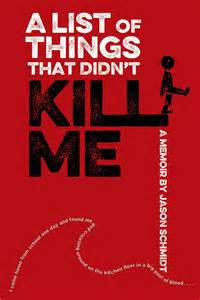Book Review: A List of Things that Didn't Kill Me
When I wasn’t reading it, I was thinking about it.
Jason Schmidt’s memoir, A List of Things that Didn’t Kill Me, covers his childhood up to his first years in college. His upbringing is anything but typical: the son of a drug dealer/addict, Jason lives on the fringes of society. He and his father, Mark, move up and down the west coast, striving for a secure and stable environment, but their lives are a series of upsets as Mark is in and out of jail, in and out of relationships, in and out of jobs.
 Jason keeps the perspective focused on his younger self; this is a child without benefit of clear adult guidance trying to make sense of a world that has unspoken rules. There is the hippie and drug culture he lives among, and then there are the “straights” – the people who are “traditional,” law-abiding citizens. Jason has to learn how to straddle these worlds without drawing undue attention on his father’s unconventional lifestyle or risk having the scant foundation he feels pulled out from under him.
Jason keeps the perspective focused on his younger self; this is a child without benefit of clear adult guidance trying to make sense of a world that has unspoken rules. There is the hippie and drug culture he lives among, and then there are the “straights” – the people who are “traditional,” law-abiding citizens. Jason has to learn how to straddle these worlds without drawing undue attention on his father’s unconventional lifestyle or risk having the scant foundation he feels pulled out from under him.
Jason’s father, Mark, is a homosexual having the first taste of freedom from the closet. But this is the 1980s, and AIDS is making its first appearance in the gay community. As Mark struggles to fully inhabit his new sense of identity, Jason simply takes it in stride that his father is dating a man. This isn’t open-mindedness but rather a child’s unquestioning acceptance of what is presented as the norm.
As he enters public school, Jason grows aware that his home life is out of whack. Since he doesn’t seem to fit in with the other kids, he gets into fights, but this lashing out is also a way of trying to gain connection. He pieces together that other people don’t live the way he does, so he becomes increasingly guarded about his home life.
 All of Jason’s friendships come across as tenuous, more a matter of circumstance rather than emotional connection. Surprisingly he stays clean: he doesn’t deal drugs, he doesn’t have sex, he doesn’t steal. This isn’t a righteously moralistic stance; he simply recognizes that if he draws attention to himself, it might bring the authorities crashing down on his head. To survive, it is essential to keep a low profile.
All of Jason’s friendships come across as tenuous, more a matter of circumstance rather than emotional connection. Surprisingly he stays clean: he doesn’t deal drugs, he doesn’t have sex, he doesn’t steal. This isn’t a righteously moralistic stance; he simply recognizes that if he draws attention to himself, it might bring the authorities crashing down on his head. To survive, it is essential to keep a low profile.
Schmidt is a good storyteller. He takes seemingly simple episodes, such as a first day at a new school, and effectively describes how it feels to be a perpetual outsider. So much of what is taken for granted among the “straights” is utterly foreign to this young boy, and there is no one to guide him through this curious landscape.
 I'm still standingOnce he becomes a teenager, Jason is consciously at odds with his father, who has become increasingly belligerent and physically abusive. Though on a deep level, Jason knows that his father's behavior is wrong, still he feels he must live the life presented to him. He takes comfort knowing that there will come a day when he will be too big to beat, so his father turns to manipulative “gas-lighting” to torture his son.
I'm still standingOnce he becomes a teenager, Jason is consciously at odds with his father, who has become increasingly belligerent and physically abusive. Though on a deep level, Jason knows that his father's behavior is wrong, still he feels he must live the life presented to him. He takes comfort knowing that there will come a day when he will be too big to beat, so his father turns to manipulative “gas-lighting” to torture his son.
For all its grueling nature, Schmidt’s memoir is very readable and sometimes quite funny. He has a wry sense of humor, and he doesn’t descend into maudlin victimization (though it would make perfect sense if he did). He keeps the story present and real, a recognizable world viewed through an outsider’s lens.
After Mark dies, Jason continues in college, all while suffering PTSD. But these episodes are glossed over as the story rushes to the conclusion that he finds a way to survive. I would be curious to read about the next phase in his life as (I’m assuming) he becomes more grounded and finds the support he needs.
I know it’s a cliché, but this story will stay with me. I needed to know how it ended, and I kept thinking about how grateful I am that I did not have to endure what he did. Schmidt has amazing resilience and insight.
For what it’s worth, I wish I had come up with the title. It perfectly captures the tone of the book.
Jason Schmidt’s memoir, A List of Things that Didn’t Kill Me, covers his childhood up to his first years in college. His upbringing is anything but typical: the son of a drug dealer/addict, Jason lives on the fringes of society. He and his father, Mark, move up and down the west coast, striving for a secure and stable environment, but their lives are a series of upsets as Mark is in and out of jail, in and out of relationships, in and out of jobs.
 Jason keeps the perspective focused on his younger self; this is a child without benefit of clear adult guidance trying to make sense of a world that has unspoken rules. There is the hippie and drug culture he lives among, and then there are the “straights” – the people who are “traditional,” law-abiding citizens. Jason has to learn how to straddle these worlds without drawing undue attention on his father’s unconventional lifestyle or risk having the scant foundation he feels pulled out from under him.
Jason keeps the perspective focused on his younger self; this is a child without benefit of clear adult guidance trying to make sense of a world that has unspoken rules. There is the hippie and drug culture he lives among, and then there are the “straights” – the people who are “traditional,” law-abiding citizens. Jason has to learn how to straddle these worlds without drawing undue attention on his father’s unconventional lifestyle or risk having the scant foundation he feels pulled out from under him.Jason’s father, Mark, is a homosexual having the first taste of freedom from the closet. But this is the 1980s, and AIDS is making its first appearance in the gay community. As Mark struggles to fully inhabit his new sense of identity, Jason simply takes it in stride that his father is dating a man. This isn’t open-mindedness but rather a child’s unquestioning acceptance of what is presented as the norm.
As he enters public school, Jason grows aware that his home life is out of whack. Since he doesn’t seem to fit in with the other kids, he gets into fights, but this lashing out is also a way of trying to gain connection. He pieces together that other people don’t live the way he does, so he becomes increasingly guarded about his home life.
 All of Jason’s friendships come across as tenuous, more a matter of circumstance rather than emotional connection. Surprisingly he stays clean: he doesn’t deal drugs, he doesn’t have sex, he doesn’t steal. This isn’t a righteously moralistic stance; he simply recognizes that if he draws attention to himself, it might bring the authorities crashing down on his head. To survive, it is essential to keep a low profile.
All of Jason’s friendships come across as tenuous, more a matter of circumstance rather than emotional connection. Surprisingly he stays clean: he doesn’t deal drugs, he doesn’t have sex, he doesn’t steal. This isn’t a righteously moralistic stance; he simply recognizes that if he draws attention to himself, it might bring the authorities crashing down on his head. To survive, it is essential to keep a low profile.Schmidt is a good storyteller. He takes seemingly simple episodes, such as a first day at a new school, and effectively describes how it feels to be a perpetual outsider. So much of what is taken for granted among the “straights” is utterly foreign to this young boy, and there is no one to guide him through this curious landscape.
 I'm still standingOnce he becomes a teenager, Jason is consciously at odds with his father, who has become increasingly belligerent and physically abusive. Though on a deep level, Jason knows that his father's behavior is wrong, still he feels he must live the life presented to him. He takes comfort knowing that there will come a day when he will be too big to beat, so his father turns to manipulative “gas-lighting” to torture his son.
I'm still standingOnce he becomes a teenager, Jason is consciously at odds with his father, who has become increasingly belligerent and physically abusive. Though on a deep level, Jason knows that his father's behavior is wrong, still he feels he must live the life presented to him. He takes comfort knowing that there will come a day when he will be too big to beat, so his father turns to manipulative “gas-lighting” to torture his son.For all its grueling nature, Schmidt’s memoir is very readable and sometimes quite funny. He has a wry sense of humor, and he doesn’t descend into maudlin victimization (though it would make perfect sense if he did). He keeps the story present and real, a recognizable world viewed through an outsider’s lens.
After Mark dies, Jason continues in college, all while suffering PTSD. But these episodes are glossed over as the story rushes to the conclusion that he finds a way to survive. I would be curious to read about the next phase in his life as (I’m assuming) he becomes more grounded and finds the support he needs.
I know it’s a cliché, but this story will stay with me. I needed to know how it ended, and I kept thinking about how grateful I am that I did not have to endure what he did. Schmidt has amazing resilience and insight.
For what it’s worth, I wish I had come up with the title. It perfectly captures the tone of the book.
Published on May 13, 2016 08:07
No comments have been added yet.



